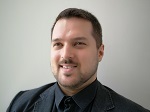The public defence will be held as a video conference over Zoom.
The defence will follow regular procedure as far as possible, hence it will be open to the public and the audience can ask ex auditorio questions when invited to do so.
Click here to participate in the public defence
Due to copyright reasons, an electronic copy of the thesis must be ordered from the faculty. In order for the faculty to have time to process the order, it must be received by the faculty no later than 2 days prior to the public defence. Orders received later than 2 days before the defence will not be processed. Inquiries regarding the thesis after the public defence must be addressed to the candidate.
Digital Trial Lecture - time and place
Adjudication committee
- First opponent: Professor Kai Rothkamm, University Cancer Center Hamburg, Germany
- Second opponent: Professor Bo Stenerlöw, Uppsala University, Sweden
- Third member and chair of the evaluation committee: Associate Professor June Helen Myklebust, Institute of Clinical Medicine, University of Oslo
Chair of defence
Professor II Jørgen Wesche, Institute of Basic Medical Sciences, University of Oslo
Principal Supervisor
Group leader Randi G. Syljuåsen, Department of Radiation Biology, Oslo University Hospital
Summary
DNA damaging agents are frequently used in cancer treatment. Radiotherapy and several types of chemotherapeutic drugs work by causing lethal DNA damage to cancer cells. However, in response to the DNA damage, the cancer cells can activate DNA repair and other signaling mechanisms, which may limit treatment efficacy.
The purpose of this thesis was to develop a large-scale screen to identify new promising treatment combinations of DNA damaging agents and compounds that inhibit DNA repair. The screen was optimized to detect DNA damage and repair after combination treatment with radiation and compound libraries, or with a DNA damaging drug and compound libraries.
The screen experiments were performed in a leukemia and a lung cancer cell line. Treatment-induced changes in DNA damage were detected with an antibody to the DNA damage marker yH2AX. Additionally, a DNA stain was used to assess cell cycle position. A pipetting robot and a flow cytometer equipped with a plate loader were used for screen automatization. In the first two papers, the screen was set up to discover compounds that synergistically increase the S-phase DNA damage effects of the WEE1-inhibitor MK1775 or the CHK1-inhibitor LY2606368. WEE1 and CHK1 are important kinases in the DNA damage response and inhibitors of these kinases are currently in clinical trials for cancer treatment. 1664 compounds were tested in combination with MK1775, and 355 compounds with both MK1775 and LY2606368. Among the candidate hits were two CHK1-inhibitors for MK1775, and the antifungal compound Ciclopirox for LY2606368. In the third paper, the screen was modified to find compounds that inhibit DNA repair after radiation. More than 1900 compounds were tested in combination with radiation. The results gave several candidate hits which are known radiosensitizers and known to interfere with DNA repair, but also a number of compounds which are not known to have such functions and will be interesting to follow up in future studies.
Additional information
contact the research support staff
